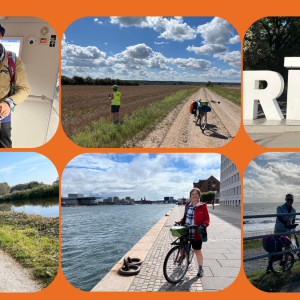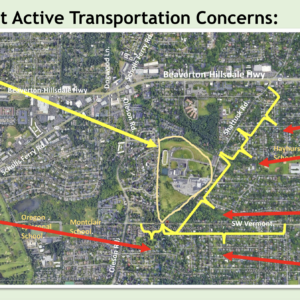Oregon State Representative Jerry Krummel, the Wilsonville Republican who backed “Eric’s Law”, is now getting behind Drowsy Driving Prevention Week.
Here’s the press release from Krummel’s office:
“I’m so glad to see this important public safety issue getting national attention”, said State Representative Jerry Krummel (R-Wilsonville). The first ever Drowsy Driving Prevention Week is being launched by the National Sleep Foundation for November 5th – 11th in an effort to increase public awareness to the dangerous of sleepy driving with an emphasis on young people and advocating for preventative measures at the state level . This is especially important with the change in Daylight Savings Time and the changing seasons.
Krummel wrote legislation this year to make it a felony if you are driving while fatigued and you kill someone. The measure also asked state transportation experts to conduct education programs on drowsy driving. House Bill 3021 was drafted at the request of Lorna Kautzky, widow of 56-year old Eric Kautzky who was killed by a sleepy driver in June of 2005. Eric was riding his bike in the bike lane along Tualatin-Sherwood Road when a 19-year old driver swerved hitting Eric from behind. The driver, who had only three hours of sleep the night before, didn’t realize he hit someone and kept going. Lorna is now a member of the Governor’s Advisory Council for DUII.“Our shock and sorrow was compounded when we found out there are no laws for driving while sleep impaired. To me this is unconscionable,” said Lorna Kautzky. “Where is the accountability for the sleepy driver? We must work for responsible behavior from the sleep impaired drivers on our roads. The sleepy driver holds as much responsibility as any other driver.” Luckily the prosecutors in Eric’s case were able to plea bargain with the offender putting him behind bars 17 months for criminally negligent homicide.
The Oregon Clinic Pulmonary and Sleep Medicine Division joins the national effort this week to help answer questions and provide information at their Gateway Medical Office Building. They will also offer special parent-teen driving agreements. Dr. Louis Libby from the Oregon Clinic explained, “a lot of recent research suggests that driving with sleep deprivation is just as dangerous as driving with an alcohol level over the legal limit. However, presently there is no law in Oregon against driving when significantly sleep deprived.” Drowsy driver information will be available between 10 am – 2 pm November 6th, 7th, and 8th at the Gateway office, 1111 NE 99th Ave, Portland. The number is 503.963.3185.
“There has been much talk about the hazards of using a cell phone while driving, yet sleepy drivers cause three times more crashes in Oregon every year,” pointed out Krummel. According to the Oregon Department of Transportation, in 2005 there were nearly 600 crashes related to drowsy drivers, 10 fatalities, and almost 500 injuries. That’s a 20% increase in the number of collisions over the past five years. The National Highway Traffic Safety Administration attributes over 100,000 crashes, 1,500 deaths and 71,000 injuries to sleepy drivers every year in this country resulting in $12 billion in monetary losses.
The National Sleep Foundation is an independent nonprofit group dedicated to improving public health and safety. This week’s campaign includes information on a new web page www.drowsydriving.org and public service announcements. A Foundation survey found 60% of drivers admitted to driving while sleepy in the past year, 20% actually dozed off at the wheel, 13% did so once a month and 4% confessed to having an accident because the were too tired to drive. The focus on young drivers is especially critically because 55% of all crashes due to fatigue involved a driver 25 years and under.
While HB 3201 did not even get a hearing during the 2007 Legislative Session, Krummel hopes the bill will be reintroduced in 2009. Nine other states attempted similar legislation this year. So far only one, New Jersey, has successfully enacted a law to punish drowsy drivers. It is called “Maggie’s Law” after a 20-year old college student who was killed 10 years ago by a driver who nodded off at the wheel.
Even though there are no simple tests to measure sleepiness, Dr. Libby noted, “certainly there are clues – anyone who has gone more than 20 hours without sleep is probably a danger to drive. Many of us are told that we can fall asleep before our head hits the pillow, a sure sign of a chronically sleepy individual who should not be driving.”







Thanks for reading.
BikePortland has served this community with independent community journalism since 2005. We rely on subscriptions from readers like you to survive. Your financial support is vital in keeping this valuable resource alive and well.
Please subscribe today to strengthen and expand our work.
It is extremely important that Americans understand the hazards and potential tragedies of drowsy driving. Each year, thousands of people are injured or die as a result of car crashes caused by driving while sleepy. Most people are aware of the dangers of driving while under the influence of alcohol, but more education is needed to communicate the grave dangers of drowsy driving, which is an all-too-common occurrence.
The National Sleep Foundation’s (NSF) first-ever “Drowsy Driving Prevention Week” kicks off the year-long campaign. NSF has created a consumer-friendly and very comprehensive collection of resources easily available for download. These educational resources include fact sheets, print PSAs, radio scripts, press releases, posters, flyers and much more. Visit http://www.DrowsyDriving.org to review the breadth of information available.
While you are on the site, you can read first-hand moving memorials and testimonials to those whose lives have been impacted by drowsy driving tragedies. These sad and poignant pieces truly hit home.
NSF is extremely committed to this cause. Education about drowsy driving prevention WILL save lives.